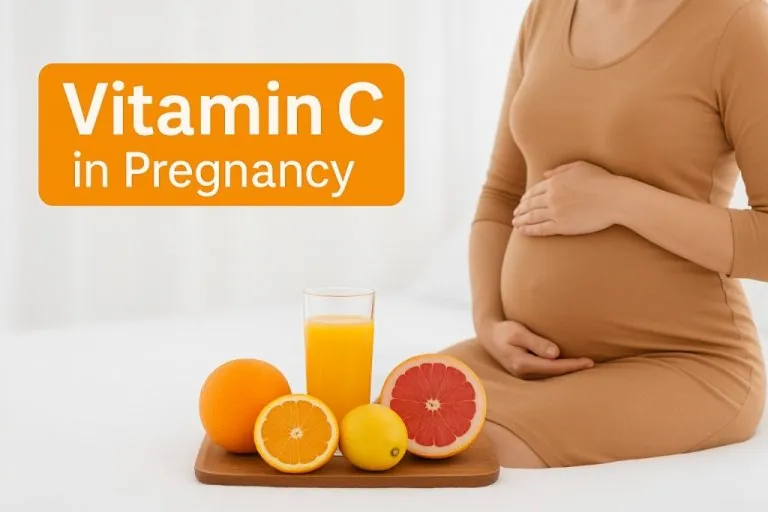Vitamin C in Pregnancy: Benefits, Risks & Recommended Intake

- Why Is Vitamin C Important During Pregnancy?
- How Much Vitamin C Do You Require During Pregnancy?
- Signs of Vitamin C Deficiency While Pregnant
- Best Vitamin C Foods for Pregnant Women
- Vitamin C Rich Food Sources With Quantity
- Are Vitamin C Supplements Safe to Consume During Pregnancy?
- Side Effects of Excessive Vitamin C in Pregnancy
- FAQs
Vitamin C is vital to the human body as it helps build the immune system and strengthens connective tissues. People who do not consume enough foods rich in Vitamin-C may suffer from poor health, weakened immunity, and bleeding gums. Vitamin C in pregnancy is especially crucial. Pregnant women are already at higher risk of infections since parts of their immune system are suppressed by hormones. Additionally, collagen production, which relies on Vitamin C, is essential for the baby’s growth and tissue repair. Therefore, ensuring adequate Vitamin C intake during pregnancy can be a saving grace, helping to boost immunity and promote overall well-being for both mother and child.
Why Is Vitamin C Important During Pregnancy?
Vitamin C can prove to be very beneficial during pregnancy. Also known as, ascorbic vitamin, this water-soluble vitamin is not produced by the body and needs to be consumed in certain amounts. It is naturally available in abundance to us in many vegetables and citrus fruits. Here are the benefits of vitamin C for pregnancy:
- Vitamin C benefits range from boosting the immune system to even combating cancer (1).
- It is well known for fighting against cold and flu viruses.
- It improves the absorption of iron and other minerals from food (2).
- It lowers the risk of cataract.
- It helps improve the process of wound healing (3).
- The role of vitamin C in pregnancy is mainly to promote the formation of collagen which is the primary component of connective tissues. This helps in healthy growth and development of the baby’s organs (4).
- Vitamin C and pregnancy are in accord as it is necessary for maintaining healthy skin, proper growth of bones and fight against infections.
How Much Vitamin C Do You Require During Pregnancy?
Regulating one’s vitamin C intake is important. As per the National Institutes of Health (NIH), a woman needs 65-75 milligrams of Vitamin C daily (5). During pregnancy, it is recommended to consume about 80-85 milligrams per day. This range increases to 115-120 milligrams per day for breastfeeding mothers.
Signs of Vitamin C Deficiency While Pregnant
Signs of Vitamin C deficiency can be vague but do exist. Slow or delayed wound healing and swollen or bleeding gums are two signs that indicate the inadequacy of vitamin c. Besides this, a weak immune system, inflamed joints and increased bruising can also be symptoms of ascorbic acid deficiency. Although rare, severe vitamin C deficiency causes scurvy.
Best Vitamin C Foods for Pregnant Women

Listed below are natural foods which have a high Vitamin C content (6):
1. Vegetables
Tomato, pepper (red, yellow and green), cabbage, kale, broccoli, sweet potato, cauliflower are some vegetables rich in Vitamin C.
2. Fruits
Fruits rich in vitamin C include orange, lemon, and tangerine. Berries, apples, grapes, apricots, persimmons, peaches, strawberries and mango also have good vitamin C content. They can be consumed directly or consumed as juices.
3. Animal Sources
Meat, fish and milk have sufficient ascorbic acid content. Lamb liver/heart (11-12mg/100g), calf (11mg/100g), human milk (4mg/100g), and cow milk (2mg/100g).
4. Briar (Thorny Bush)
Usually brewed and can be had as tea, it is a good source of Vitamin C.
5. Green Leaves
Parsley is a great source of Vitamin C.
Vitamin C Rich Food Sources With Quantity
| Food | Serving Size | Vitamin C (mg) |
| Vegetables and Fruit | ||
| Vegetables | ||
| Peppers (red, yellow) raw | 125 mL (½ cup) | 101-144 |
| Peppers (red, green), cooked | 125 mL (½ cup) | 121-132 |
| Peppers, green, raw | 125 mL (½ cup) | 63 |
| Broccoli, cooked | 125 mL (½ cup) | 54 |
| Cabbage, red, raw | 250 mL (1 cup) | 42 |
| Brussels sprouts, cooked | 125 mL (4 sprouts) | 38-52 |
| Kohlrabi, cooked | 125 mL (½ cup) | 47 |
| Broccoli, raw | 125 mL (½ cup) | 42 |
| Snow peas, cooked | 125 mL (½ cup) | 41 |
| Cabbage, cooked | 125 mL (½ cup) | 30 |
| Cauliflower, raw or cooked | 125 mL (½ cup) | 27-29 |
| Kale, cooked | 125 mL (½ cup) | 28 |
| Rapini, cooked | 125 mL (½ cup) | 24 |
| Potato, with skin, cooked | One medium | 14-31 |
| Bok Choy, cooked | 125 mL (1/2 cup) | 23 |
| Sweet potato, with skin, cooked | One medium | 22 |
| Asparagus, frozen, cooked | six spears | 22 |
| Balsam-pear/bitter melon | 125 mL (½ cup) | 22 |
| Turnip greens, cooked | 125 mL (½ cup) | 21 |
| Snow peas, raw | 125 mL (½ cup) | 20 |
| Collards, cooked | 125 mL (½ cup) | 18 |
| Tomato, raw | one medium | 14 |
| Tomato sauce, canned | 125 mL (½ cup) | 8-9 |
| Tomatoes, canned, stewed | 125 mL (½ cup) | 11-12 |
| Fruits | ||
| Guava | 1 fruit | 206 |
| Papaya | ½ fruit | 94 |
| Kiwifruit | 1 large | 84 |
| Orange | one medium | 59-83 |
| Lychee | 10 fruits | 69 |
| Strawberries | 125 mL (½ cup) | 52 |
| Pineapple | 125 mL (½ cup) | 42-49 |
| Grapefruit, pink or red | ½ fruit | 38-47 |
| Clementine | one fruit | 36 |
| Cantaloupe | 125 mL (½ cup) | 31 |
| Mango | ½ fruit | 38 |
| Avocado, Florida | ½ fruit | 26 |
| Soursop | 125 mL (½ cup) | 25 |
| Tangerine or mandarin | one medium | 24 |
| Persimmon | 125 mL (½ cup) | 17 |
| Berries (raspberries, blueberries, blackberries) | 125 mL (½ cup) | 14-17 |
| Juice | ||
| Juice (orange, grapefruit, apple, pineapple, grape) , Vitamin C added | 125 mL (½ cup) | 23 – 66 |
| Fruit and vegetable cocktail | 125 mL (½ cup) | 35 – 73 |
| Guava nectar | 125 mL (½ cup) | 26 |
| Grain Products | This food group contains very little of this nutrient. | |
| Milk and Alternatives | This food group contains very little of this nutrient. | |
| Meats and Alternatives | This food group contains very little of this nutrient. | |
Source: “Canadian Nutrient File 2015”
www.hc-sc.gc.ca/fn-an/nutrition/fiche-nutri-data/index-eng.php
Are Vitamin C Supplements Safe to Consume During Pregnancy?

Consuming them during daily meals in a well-balanced diet is the safest way and is sufficient to meet the required needs. Some studies have shown that high vitamin C supplement consumption can increase the risk of premature birth (7). Therefore, you should consult a physician before taking any supplements.
Side Effects of Excessive Vitamin C in Pregnancy
Since Vitamin C is a water-soluble vitamin, it is not stored in our body and any excess is excreted. Still, it is important to keep in mind not to consume extremely high dosage (>2000 milligrams). Here are a few effects of vitamin C overdose in pregnancy:
- Diarrhoea
- Kidney stones
- Abdominal cramps
- Higher risk of high blood pressure for the mother
A common question that pregnant women ask is if too much consumption of Vitamin C cause miscarriage? Although there have been instances of women suffering from miscarriages, there is no scientific proof that this is caused by Vitamin C. Pregnancy is a time when women need to protect their bodies and a healthy amount of this nutrient can help keep problems like low immunity at bay.
FAQs
1. Does vitamin C affect fetal brain development?
Yes, positively. Vitamin C is crucial for neurotransmitter synthesis and antioxidant protection in the developing fetal brain. Animal studies suggest severe deficiency may impair brain development, but moderate intake supports cognitive health. More human studies are needed, but ensuring adequate Vitamin C is beneficial.
2. Can vitamin C help prevent stretch marks during pregnancy?
Possibly, but not definitively. Vitamin C supports collagen production, which maintains skin elasticity. While it may reduce the risk of severe stretch marks, genetics, hydration, and weight gain play bigger roles. Topical Vitamin C serums + dietary intake could help, but they’re not a guaranteed fix.
3. Is liposomal vitamin C safer than regular vitamin C for pregnant women?
Liposomal Vitamin C is gentler on the stomach (reducing nausea) and has higher absorption rates, making it a good option for pregnant women with digestive sensitivities. However, standard Vitamin C (ascorbic acid) is equally safe at recommended doses. Choose based on tolerance and budget.
4. Does vitamin C interfere with prenatal iron absorption?
No—it enhances it! Vitamin C converts non-heme iron (from plant-based foods) into a more absorbable form, combating pregnancy-related anemia. Many prenatal vitamins include both nutrients. Take iron supplements with orange juice or Vitamin C-rich foods for better results.
We hope we’ve answered your question – can you take vitamin C during pregnancy? Vitamin C plays a crucial role in forming collagen and is required for the healthy development of the baby. The healthiest way to intake vitamin C is by including vitamin C rich fruits and vegetables in the daily diet.
Also Read:
Taking Vitamin E during Pregnancy
Vitamin Intake during Pregnancy
Vitamin A during Pregnancy
Vitamin B2 (Riboflavin) in Pregnancy
Was This Article Helpful?
Parenting is a huge responsibility, for you as a caregiver, but also for us as a parenting content platform. We understand that and take our responsibility of creating credible content seriously. FirstCry Parenting articles are written and published only after extensive research using factually sound references to deliver quality content that is accurate, validated by experts, and completely reliable. To understand how we go about creating content that is credible, read our editorial policy here.




































